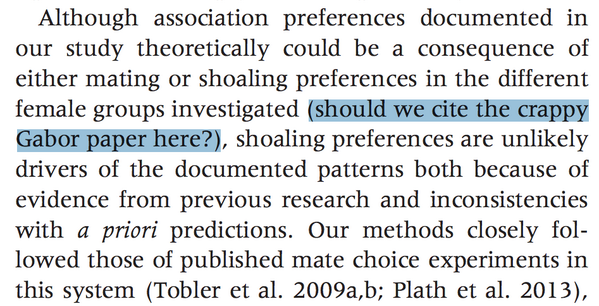| "Sollen wird den schreckliche Gabor Artikel zitieren?" |
Offensichtlich haben die Autoren und die Editoren diese nicht für den Leser gedachte Klammer übersehen. Das Paper wurde vom Verlag Wiley kurzfristig zurückgezogen und neu gesetzt.
Slate:
It comes in the main text of a paper titled "Variation in Melanism and
Female Preference in Proximate but Ecologically Distinct Environments,"
which was published in a recent issue of the journal Ethology. Here's
the unintentionally candid passage, as highlighted by UC-Davis grad
student Dave Harris:
The blooper was picked up by Retraction Watch, which contacted both
the authors and the publisher for comment. The corresponding author
told Retraction Watch the Gabor line "was added into the paper by a
co-author during revision (after peer review)," and no one spotted it
in the course of the final proofreading process. He apologized for the
put-down, adding, "I would never condone this sentiment towards another
person or their work."
Wiley, the publisher, responded by removing the paper and says it will
republish it with the line removed and the change noted. "We are in
the process of investigating how this line made it to publication,"
the Wiley spokesperson said.
That's a good question. Typos and editing mistakes are common on blogs
and even in print newspapers, where reporters and editors are working
on tight deadlines. But academics typically have weeks or even months
to edit a paper before the journal goes to press, and the peer review
process means that it has to go through close reads by multiple experts
in the relevant field.
For that reason, errors this glaring in the main text of an article are
relatively rare, says Meredith Carpenter, a postdoctoral researcher at
Stanford and co-author of the science-humor blog Seriously, Science? As
Carpenter and co-author Lillian Fritz-Laylin explained in a Slate
post last year, overly honest asides are more commonly found in the
acknowledgements section, which tends not to be peer-reviewed.

